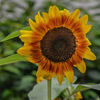shooting on a winter day
Dec 18, 2013 19:26:01 #
Snow clung to trees and a fresh blanket of snow is a photo waiting to happen. I would love to hear from others as to what you do when shooting in winter light.?? By that , I mean metering for white out bright light causing the subject to be dark. Hazy gray sky, dull colors ??? Curious what settings you change from fall to winter ........ WB ??
Thanks in advance for any, all imput.
Thanks in advance for any, all imput.
Dec 18, 2013 20:30:02 #
First off, you know your camera's meter will be fooled. Shoot a couple of stops under, see what you get, and go from there...in manual. I used to meter off my hand extended towards the subject, set to those numbers, and I wasn't too far off (sometimes) ;-) ;-)
Dec 18, 2013 20:40:03 #
To me it sounds louder, then there is a risk of avalanche...
Sorry could not help this off the cuff, off topic answer...
Disregard. :shock: :lol:
Sorry could not help this off the cuff, off topic answer...
Disregard. :shock: :lol:
Dec 18, 2013 20:47:48 #
Canoe50d wrote:
The only thing you have to worry is the light intensity. This is similar to shooting pictures of a beach in summer. Like on the beach incident and reflective lights are a factor. In both cases a gradient neutral density filter maybe a good idea so is the use of a polarizing filter.Snow clung to trees and a fresh blanket of snow is a photo waiting to happen. I would love to hear from others as to what you do when shooting in winter light.?? By that , I mean metering for white out bright light causing the subject to be dark. Hazy gray sky, dull colors ??? Curious what settings you change from fall to winter ........ WB ??
Thanks in advance for any, all imput.
Thanks in advance for any, all imput.
The only things you have to care is your camera and lens temperature. You have the issue in summer: too hot and you get heat noise on your sensor. In winter it will not a problem but condensation from thermal shock can become one.
On a side effect when cold a battery does not last as long as the chemical reaction inside is slowed down.
Good luck and try not to catch death.
Dec 19, 2013 07:36:39 #
Canoe50d wrote:
Snow clung to trees and a fresh blanket of snow is a photo waiting to happen. I would love to hear from others as to what you do when shooting in winter light.?? By that , I mean metering for white out bright light causing the subject to be dark. Hazy gray sky, dull colors ??? Curious what settings you change from fall to winter ........ WB ??
Thanks in advance for any, all imput.
Thanks in advance for any, all imput.
There are many things one can do, but I will always set my EC to -0.7 when shooting in snow (I use aperture priority mode), then adjust in post, if necessary.
Dec 19, 2013 16:17:58 #
Dec 19, 2013 16:23:09 #
pappy0352 wrote:
When shooting snow I always set my EC to +1
Pappy
Pappy
You DO mean -1, right?
You don't intentionally OVEREXPOSE, do you?
Or is your camera backwards from the norm?
Dec 19, 2013 16:26:57 #
djtravels wrote:
First off, you know your camera's meter will be fooled. Shoot a couple of stops under, see what you get, and go from there...in manual. I used to meter off my hand extended towards the subject, set to those numbers, and I wasn't too far off (sometimes) ;-) ;-)
If the meter is going to be fooled (with its attempt to reach 18% gray) why would you underexpose. To bring a more realistic tone, I would think that you would make your exposure to account for even more light. Can you explain!
Black, shoot with less light. Snow- shoot with more light. It is not immediately intuitive.
Dec 19, 2013 16:34:11 #
lightchime wrote:
If the meter is going to be fooled (with its attempt to reach 18% gray) why would you underexpose. To bring a more realistic tone, I would think that you would make your exposure to account for even more light. Can you explain!
Black, shoot with less light. Snow- shoot with more light. It is not immediately intuitive.
Black, shoot with less light. Snow- shoot with more light. It is not immediately intuitive.
(Long explanation omitted)
Try it yourself.
If you don't have snow, then you probably have sand.
Same idea.
Dec 19, 2013 16:43:11 #
Wall-E wrote:
You DO mean -1, right?
You don't intentionally OVEREXPOSE, do you?
Or is your camera backwards from the norm?
You don't intentionally OVEREXPOSE, do you?
Or is your camera backwards from the norm?
No I mean +1 as a camera see's snow as gray.
Pappy
Dec 19, 2013 17:33:08 #
Dec 19, 2013 17:37:44 #
pappy0352 wrote:
No I mean +1 as a camera see's snow as gray.
Pappy
Pappy
Absolutely, the camera meter says there is too much light and vastly underexposes so you need to adjust for that.
White sheet and a face is popping thru a hole in the sheet. It will meter off the sheet and underexpose the scene. Black sheet with a face popping thru will overexpose and you need to adjust for the scene.
Dec 19, 2013 22:44:44 #
Wall-E wrote:
(Long explanation omitted)
Try it yourself.
If you don't have snow, then you probably have sand.
Same idea.
Try it yourself.
If you don't have snow, then you probably have sand.
Same idea.
I live in the snow belt - S.O.P. is to increase exposure when shooting a lot of snow. One must be careful, however, with the sky because it gets blown out. Those who decrease exposure often don't realize that they are darkening the snow and deepening the reflection of the blue (I wish) sky.
Solution: increase exposure for the snowy background and try to avoid sky.
Come up north in the winter and see for yourself.
If we have a "White Christmas" my friends will be out shooting frozen waterfalls.
The basis is dealing with neutral gray.
Dec 20, 2013 00:44:15 #
Since we don't get any snow where I live, I get on the computer while listening to 'Shine on, You Crazy Diamond' on Pandora while reading the 'Hog'...Norm
Dec 20, 2013 05:50:46 #
lighthouse
Loc: No Fixed Abode
Pappy and lightchime and tk are absolutely right.
It's very intuitive. Makes perfect logical sense.
Also the light can tend to be very blue (in sunny and overcast conditions) so using the cloudy or shade white balance setting can be helpful as well.
It's very intuitive. Makes perfect logical sense.
Also the light can tend to be very blue (in sunny and overcast conditions) so using the cloudy or shade white balance setting can be helpful as well.
If you want to reply, then register here. Registration is free and your account is created instantly, so you can post right away.







